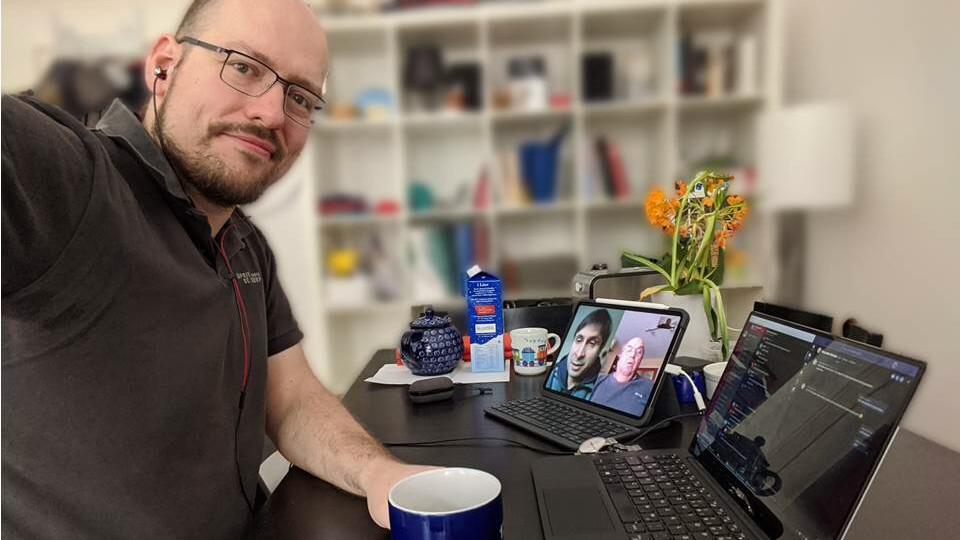The content on this page was translated automatically.
"The crisis also offers freedom".
 Image: André Knie.
Image: André Knie.Dr. Knie, you have two small children, and your wife is a scientist herself. How do you organize everyday family life with your wife and children now that everyone is home at the same time?
Yes, with two children under the age of two, in a household with two researchers, consistency suffers the most. My wife and I take turns taking care of the kids. But due to the many appointments, there is then little time to "work away something in peace". That only works in the evening, when the children are asleep.
On a scale of 1 (very awful) to 10 (very great): How do you find it as a scientist to simply hole up at home?
Even if the occasion is not a great one - I give it a seven for the group's work, i.e. rather positive. Many everyday disruptive factors are eliminated and the researchers - without small children - can often concentrate very well. However, most of my days are still full of meetings, only now online. In the research group, however, we focus more on evaluating and publishing research data.
Does this evaluation also inspire you to come up with new research questions?
New research questions are always welcome, and often come from reading other groups' publications. But the real questions need to be discussed directly. At the moment, we therefore prefer to use the time to reduce our data mountain and publish.
When you are not reducing mountains of data, what do you miss most in your home office?
First, I really miss our coffee machine in the seminar room. Both the coffee and the brief exchange with colleagues while doing so.
Second: Overall, the infrastructure in a good home office is not comparable to that in the institute.
What do you usually do with this infrastructure?
My research goal is to understand how radiation damage happens in cells on an atomic scale. To do this, we first try to reproduce in artificial molecules how electrons and energy move across many atoms. The smaller the target, the bigger the machines. That's why we do our experiments at large-scale research facilities called synchrotron radiation accelerators, such as BESSY at Helmholtz-Zentrum Berlin or PETRA III at DESY Hamburg.
We prepare these experiments meticulously in the laboratory. Unfortunately, the preparation for such an experiment is currently on hold. The accelerators are also closed in the corona crisis
How do you usually supervise these experiments?
The experiments are very complicated. Many components, unique in the world, have to function simultaneously and deliver maximum performance. This requires many people and a lot of experience. Typically, doctoral and master's students carry out the experiments. To ensure that nothing goes wrong, however, very experienced scientists are always there to teach the young people everything they need to know and are always available to answer questions.
Now, however, contacts are reduced to a minimum, making joint experiments difficult. How has your daily research routine changed because of the current situation?
Yes, all the experiments, the preparation and real experiments, are not possible at the moment. Especially for us - here several people always have to work on an experiment at the same time - the risk would otherwise be too great. That's why we are actually all in the home office, either working on the analysis of data from previous experiments or preparing publications.
How do you organize yourself in the research group then? Has the bureaucracy at least become less?
Partly, partly. Some things are much simpler and a phone call and a short e-mail is enough, where before a letter had to go through official channels. On the other hand, some processes that still have to go through official channels require a lot of effort. You have to agree on where, when and who can sign and how documents from the home office can be transferred to the administration.
Even if there are restrictions on the experiments, what do you take away from the corona crisis for your scientific work?
It's still a little hard to overview after two weeks. But I think that it is already becoming apparent that we should also set up such home office weeks in normal times in order to be able to work through things in peace. We are, after a bit of a bumpy start, now much more comfortable with digital tools for meetings, group work and everyday little questions. We can certainly use that much more easily in the future.
We know that creativity requires a lot of free space and social contact. Free space is definitely offered by the crisis, but the lack of common coffee breaks is not good for the social fabric and creativity.
Dr. André Knie is subgroup leader of spectroscopy and physics with synchrotron radiation at the University of Kassel.
Interview: Christine Graß.